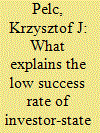| Srl | Item |
| 1 |
ID:
162022


|
|
|
|
|
| Summary/Abstract |
Global energy governance has received increased attention from scholars and policymakers in recent years. Much of the discussion has focused on the inadequacy of the current institutional architecture, particularly in light of the urgent need to decarbonize energy systems. However, little attention has been given to the capacity of global institutions to promote investment in renewable energy. This article considers claims by proponents of the Energy Charter Treaty, the most developed trade and investment treaty in the global energy architecture, that it can play an important role in this regard. Specifically, it examines the ECT’s investor-state dispute settlement mechanism. Drawing on scholarship in global governance, law, and economics and an analysis of recent investor-state disputes, the article argues that there are problems with the assumptions underlying the claims of the ECT’s proponents. Critically, there is still a lack of evidence that the ECT has a positive impact on flows of investment in any sector, including the renewable energy sector. There is also a risk that ISDS could be used by the fossil fuel industry to impede a clean energy transition. States should approach accession to the ECT with caution and consider other mechanisms to reduce risk for renewable energy investors.
|
|
|
|
|
|
|
|
|
|
|
|
|
|
|
|
| 2 |
ID:
154544


|
|
|
|
|
| Summary/Abstract |
The treatment of foreign investment has become the most controversial issue in global governance. At the center of the controversy lies the mechanism of investor-state dispute settlement (ISDS), which allows private firms legal recourse against governments if government interference has degraded their investment. Using newly released data covering 742 investment disputes, I assess some of the central claims about ISDS. I argue that the regime has indeed undergone an important shift: a majority of claims today deal not with direct takings by low-rule-of-law countries, but with regulation in democratic states. Such “indirect expropriation” claims have seen a precipitous decrease in their odds of legal success over the past twenty years. They are also far less likely to result in early settlement. These parallel trends may be a result of a rise in strategic litigation by investors whose aim is not only to obtain compensation but also to deter governments' regulatory ambitions.
|
|
|
|
|
|
|
|
|
|
|
|
|
|
|
|